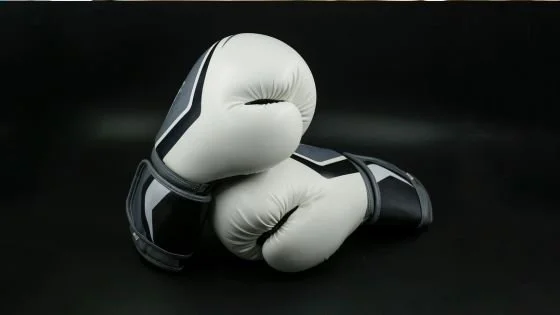The Good Fight: The Art of Conflict Resolution
“Love is a battlefield,” sang Pat Benatar. And, honestly, she wasn’t wrong. But if we’re not careful, we can find ourselves treating our partner like our opponent instead of our teammate.
Conflict in relationships can feel like a tornado coming through on an otherwise sunny day. The dishes you didn’t put in the dishwasher last night? Suddenly, that’s the reason for the downfall of civilization as we know it. But the good news is that conflict—handled well—can actually bring us closer. So, let’s dive into how to approach disagreements with mutual respect and resilience, transforming potential landmines into opportunities for growth and connection.
Set the Foundation with Mutual Respect
Think of respect as the padding in your boxing gloves. It softens the impact and reminds your partner that you’re here to talk, not spar. Respect isn’t about being overly polite or tiptoeing around each other; it’s about showing up with the understanding that your partner’s thoughts, feelings, and experiences are just as valid as yours.
What Does Mutual Respect Look Like?
Mutual respect in a relationship is all about those little everyday choices. It’s about listening without planning your counterattack (even if you really want to jump in and point out the five ways you think they’re wrong). It’s about reframing “winning” the argument as “finding a solution” that works for both of you. And it’s about remembering that this is the person you chose to be with, so try to avoid turning into a ruthless master debater every time they forget to buy milk. Respect means understanding that you don’t have to agree with your partner to acknowledge their viewpoint. It’s equally as simple and as challenging as saying, “I hear you. Let’s figure this out together.”
Recognizing and Repairing Resentment
Resilience in a relationship is the ability to pick yourselves up, dust each other off, and move forward together after conflict. It’s about holding onto each other instead of holding onto grudges. Resentment, on the other hand, works in the opposite direction. It’s like a slow leak in your relationship’s tire—one you barely notice until you find yourself stranded on the side of the road, asking why everything feels so exhausting.
When we carry resentment, even the smallest conflicts can feel overwhelming. And here’s the kicker: resentment often builds quietly. It’s insidious. It can start as a little grumble (“Can they really not see that the trash is overflowing?”) and turn into a full story of injustices, starring you as the long-suffering martyr and your partner as the oblivious villain.
What does resentment look like in action? Here’s how resentment can slowly chip away at your resilience and sabotage your ability to resolve conflicts:
Small Stuff Sweater: Ever notice how when we’re feeling resentful, we embody the sudden ability to perfectly recall every single thing our partner has ever done wrong? It’s like our brain keeps a greatest-hits playlist of grievances on repeat. This makes it tough to move forward, as every conflict feels like all past conflicts rolled into one. “Remember when you didn’t unload the dishwasher in 2018? It was October but inclemently warm. I was suffering with allergies (tree pollen to be specific) and the dog missed her flea meds? You don’t recall?”
Defensiveness Trigger: Resentment comes out in our tone, our words, and our silence. If you’ve been holding onto a sense of injustice, it’s easy to communicate in ways that your partner reads as critical or harsh. When your partner picks up on this, they’re likely to get defensive, escalating the conflict rather than resolving it. It’s like pouring gasoline on a small spark.
Forgiveness Blocker: Resentment feeds on grudges making it hard to forgive and harder to let go. If you find yourself in “I’m fine” mode, but you’re still mentally tallying up your partner’s infractions, resentment might be lurking.
Pet Peeve Transformer: What used to be a simple annoyance, like socks on the floor, suddenly becomes a symbol of “the way you never respect my boundaries.” Resentment is like a magnifying glass, turning quirks into character flaws.
Constructive Communication Saboteur: Resentment builds up like pressure in a balloon, and when conflict arises, it’s easy to let everything spill out at once. Instead of addressing one issue with constructive, solution-focused language, you might find yourself saying things like, “And another thing…” or “You always do this!” When past hurts sneak into the conversation, it derails productive problem-solving and leaves both of you feeling unheard and misunderstood.
Genuine Repair Blocker: Conflict resolution relies on an ability to repair after an argument. But if you’re holding onto resentment, it’s hard to fully engage in a repair process. You might go through the motions of saying “sorry” or agreeing to move on, but if you’re still stewing over the issue internally, the next disagreement will only reignite the unresolved feelings. Resentment keeps you from truly letting go, making every apology feel incomplete.
When resentment is in the mix, it’s nearly impossible to engage in healthy conflict resolution. Letting go of resentment isn’t about sweeping things under the rug or pretending everything’s perfect. It’s about learning how to clear the air so that you can bounce back and move forward together.
Build Resilience as a Team
Earlier I mentioned resilience as your collective ability to bounce back after a tough conversation (or twelve). Think of it as your emotional Teflon—it helps you shake off those sticky arguments. Relationships without resilience tend to collect grievances like dust bunnies under the bed: invisible for a while but accumulating grime in your relationship environment.
How Do You Build Resilience?
A key component of resilience is knowing that disagreements don’t have to be relationship-defining. You might fight about who forgot to pay the water bill, but that doesn’t mean you’re doomed. Here are a few ways to build resilience together:
Create a weekly “check-in” ritual. Once a week, take 10 minutes to talk about any lingering issues or things that went unaddressed. It’s like a relationship oil change.
Practice gratitude, even after a fight. Maybe you don’t feel thankful for the argument itself, but you can still appreciate the fact that your partner stuck around to resolve it with you.
Forgive each other often. Think of it this way: neither of you is perfect, so cut yourselves, and each other, some slack.
The bottom line? A resilient relationship can take a hit and still bounce back. It’s about building trust that, even after the dust settles, you’re both still committed to each other.
Master Conflict Resolution Techniques
Now that you’ve got your mutual respect and resilience toolbox packed, let’s dive into the actual art of conflict resolution. Spoiler alert: It involves a lot more listening than talking.
Communication Tips for Constructive Conflict
Imagine you’re both builders working on a shared project: the “relationship house.” Every conversation, especially the tough ones, is either adding bricks to make the house stronger or pulling them out one by one. Here are some health and safety tips to ensure a solid home:
Use “I” Statements – Instead of “You always make me feel…” try “I feel frustrated when…” It’s a small tweak, but it keeps your partner from feeling attacked.
Practice Fair Fighting - When tempers flare, it’s easy to throw out insults, bring up past grievances, or hit below the belt. But these “low blows” only serve to hurt your partner and make it harder to resolve the current issue. Fair fighting means sticking to the present issue, avoiding personal attacks, and focusing on finding solutions rather than winning. Agree on a few “rules of engagement” for arguments—like no yelling, no name-calling, and no stonewalling (shutting down completely). These guidelines help keep both of you accountable to respectful behavior, even when emotions are high.
Repeat Back What You Heard – As therapists we utilize several techniques and exercises to practice this idea of mirroring. “I feel like you don’t appreciate all the work I do around the house,” and try responding with, “So, you’re feeling like I don’t acknowledge your contributions at home?” This shows your partner that you’re listening and gives them a chance to clarify.
Take Breaks When Needed – Sometimes you’re just too heated to keep things civil. And that’s real! Agree to a “time-out” system, and return when you’re both in a better headspace. A snack break works wonders. Conflict resolution tip: Resource yourself. Be present enough to take care of your basic needs.
Setting Boundaries and Knowing When to Call a Truce
We all have those topics that send us over the edge (the in-laws, politics, the dishwasher again). Recognize your “danger zones” and set boundaries around them. Agree on times to discuss tricky topics, and know when to call a truce before things spiral out of control.
Repair and Reconnect
The best part of a “good fight” is making up afterward. Repairing doesn’t mean forgetting the argument happened; it means addressing any lingering feelings and then coming back together with a renewed sense of partnership. Offer a Genuine Apology. No “sorry you felt that way” cop-outs. Own your part, acknowledge your partner’s experience, and let them know you value the relationship more than being right. Reconnect with a Ritual. Whether it’s a hug, a funny inside joke, or a cup of tea together, make a habit of ending each conflict with a moment of warmth.
Embrace the Good Fight
Every couple has disagreements. It’s part of life, just like laundry and taxes. But when you approach discord with mutual respect and resilience, conflicts become opportunities for growth as opposed to cracks in the foundation. So the next time you’re in the ring with your partner, remember: you’re not opponents—you’re a team. And the goal is to emerge stronger, together. In the end, the good fight isn’t about winning; it’s about building a relationship that can weather any storm, one respectful conversation at a time.
Hey there! I’m Tamsin, and I am a Licensed Professional Counselor Associate located in League City, Tx. I am an LBGTQ+ affirming counselor, specializing in helping people see their relationship in a new way so they can change their behavior. I believe we can all have the relationship we really want by challenging our mindsets and learning to grow together. If you're seeking a therapist who will sit with you as we explore all the pieces of your relational puzzle in a non-judgmental way, please call (832) 827-3288. Our Center serves couples and individuals in League City and Houston, Texas and all residents of Texas online!
Interested in Meeting a Couples Therapist in League City, TX?
If you want to improve your relationship and reconnect with your partner, take action now and start being more curious about your relationship. At Center For Couples Counseling, one of our skilled couples therapists can help you and your partner navigate your challenges and rediscover the curiosity and passion that brought you together in the first place. Don't wait any longer to invest in the health and happiness of your relationship. To meet with a couples therapist follow these three simple steps:
Contact us to schedule an appointment
Meet with one of our skilled couples therapists
Begin to find the curiosity in your relationship and reconnect with your partner!
Other Services Offered at Center for Couples Counseling
At Center For Couples Counseling, our team of skilled therapists understands that your relationship may be facing different challenges. In addition to couples therapy, our Texas practice offers individual therapy, infertility counseling, postpartum anxiety and depression counseling, therapy for self-care and burnout, and therapy for perfectionism. For more about us check out our FAQs and blog!






